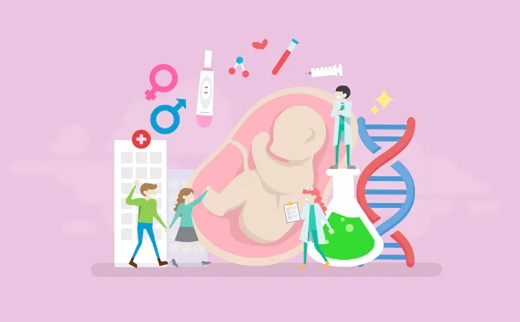
An IVF treatment cycle covers ovarian stimulation and egg retrieval, insemination/ICSI, and embryo transfer stages. Expectations of many couples getting pregnant through IVF treatment is excellently high, the low success rate is unacceptable to them. However, natural fertility rate is only about 20% per month for a healthy, fertile 30-year-old woman. The chance of getting pregnant naturally increases cumulatively and at the end of the sixth month, it reaches 75%.
However, IVF treatment offers the highest chance of pregnancy in couples seeking a baby but cannot conceive naturally.
Centers for Disease Control (CDC) reported pregnancy rate for IVF treatment, in an average of 27.3% of all cycles (higher or lower depending on the age of the woman) and the percentage of cycles that resulted in live births was 22.2% on average (higher or lower depending on the age of the woman) in 2016. However, the CDC recently found that the success rate is increasing in every age group as the techniques are refined and doctors become more experienced.
SART (Society For Assisted Reproductive Technology) in USA reported the preliminary data of the percentage of Live Births per Egg Retrieval of 2019 as:
| Births per retrieval (All transfers, including frozen embryos) | Births per retrieval (First transfer) | |
|---|---|---|
| For women ages | Percentage | Percentage |
| <35 | 54.8% | 38.4% |
| 35 to 37 | 42.9% | 29.3% |
| 38 to 40 | 29.7% | 19.4% |
| 41 to 42 | 14.9% | 9.9% |
| >42 | 4.4% | 3.1% |
According to this report females who are under the age of 35 have a 54.8 percent chance of getting pregnant after their first IVF cycle (this could mean a few embryo transfers – some of them frozen), while females between the ages of 41 and 42 have a less than 14.9 percent chance of success.
The cumulative effect of three full cycles of IVF increases the chances of a successful pregnancy. Therefore, 3 IVF cycles recommended as it is both the most cost effective and clinically effective number for women under the age of 40.
The likelihood that a cycle of in vitro fertilization will result in pregnancy depends on a number of factors including the reason for infertility, where you are having the procedure done, and your age.
What factors affect the success rates in IVF? ▶
Although the general statistics can give you an idea of IVF success, your doctor will able to better predict your individual chances depending on your personalized factors.
You will be asked some questions:
The personal factors of woman:
A woman's age is a major factor in the success of IVF for any couple. The younger the woman the better the IVF success rate, especially under 35 years. While getting older, the chance of ovaries to respond ovarian stimulation hormones decreases which in turns means fewer numbers of eggs. Egg quality deteriorates with age, resulting in a lower percentage of implantation and a lower pregnancy rate.
What is the importance of woman’s age in IVF success rate? ▶
The better ovarian reserve (the number of high-quality fertilizable eggs left in your ovaries),the higher the chances for IVF success.
What is the importance of ovarian reserve in IVF success rate? ▶
The healthier fallopian tubes, the higher IVF success rates. Women with a fluid-filled blockage in one or both fallopian tubes (called a hydrosalpinx) who undergo IVF have less than half the rate of pregnancy of IVF patients who do not have hydrosalpinx. They also suffer more miscarriages. Even if only one tube is affected, the tubal fluid from that tube may accumulate in the uterus and prevent implantation of embryos or be toxic to the embryo. A simple procedure called salpingectomy before attempting IVF can bump up the odds for success.
What is the importance of Fallopian tubes in IVF success rate? ▶
The chances for IVF success decrease when healthy lifestyle isless (smoking, obesity or underweight, stress).
What is the importance of lifestyle in IVF success rate? ▶
After one or more unsuccessful IVF treatment cycles couples become very upset, this situation is devastating and frustrating for them.
Why is IVF not always successful? ▶
One of the most common reasons for an unsuccessful IVF cycle is low quality of the embryo. Many embryos are unable to implant after transfer to the uterus as they are defective. Although some embryos look healthy in the laboratory they might have chromosomal defects that cause them not to survive and do not attach to endometrium.
If pregnancy is not achieved despite 3 cycles of good quality embryos, it is considered as recurrent or repeated implantation failure.